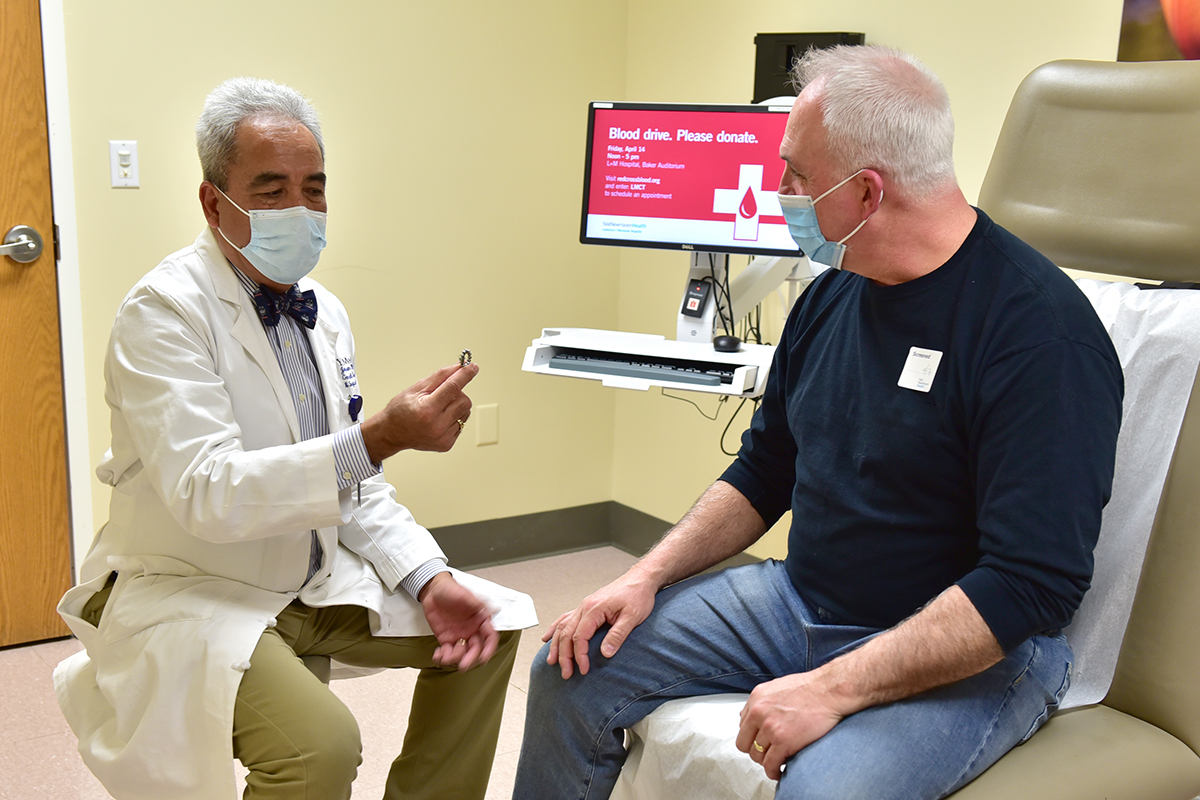
A physician and his patient talking inside of an exam room.
You just had a big meal — and now you’ve got “heartburn.” It’s the most recognizable symptom of acid reflux, and it happens to nearly everyone at some point in life. But if you regularly have acid reflux/heartburn symptoms more than twice a week, you may want to consider a new procedure that is available at Lawrence + Memorial Hospital.
Acid reflux occurs because a valve at the end of your esophagus doesn’t close properly after food enters your stomach. When the acidic contents from your stomach move back up into your esophagus, it causes an uncomfortable burning sensation in your chest, neck and throat. Other symptoms include nausea, a chronic cough and difficulty swallowing.
Brian Bates of Waterford knows the symptoms well. Now 62 years old, he began experiencing heartburn and acid reflux as a teenager. “In my 20s, I saw a doctor who told me it was no big deal. I just needed to cut down on eating chocolate, don’t drink coffee, stay away from alcohol and spicy foods. Basically, he told me to stop living,” Bates said.
His symptoms continued for years, eventually becoming so severe that he couldn’t eat many of his favorite foods without experiencing severe heartburn and making it impossible to sleep at night. “I would wake up 10-15 times a night, choking and not being able to breathe, or coughing to the point where I’d throw up,” he said.
GERD: When your symptoms persist
Bates sought help from Jonathan Blancaflor, MD, a general surgeon who specializes in robotic surgery at Lawrence + Memorial Hospital and is assistant professor of Clinical Surgery at Yale School of Medicine. Dr. Blancaflor confirmed that Bates was suffering from gastroesophageal reflux disease (GERD), a chronic and more severe form of acid reflux. He was also diagnosed with a hiatal hernia, which happens when the sphincter at the base of the esophagus is damaged so that even more acid can travel out of the stomach.
According to the National Institute of Diabetes and Digestive and Kidney Diseases (NIDDK), approximately 20 percent of people in the United States suffer from GERD. Causes and risk factors include overeating, obesity, smoking and pregnancy. Many people can manage their symptoms with lifestyle changes or medications. If left untreated, however, GERD can cause serious complications or lead to cell changes in the esophagus which can potentially lead to cancer. “GERD is often misunderstood, even by some physicians,” Dr. Blancaflor said.
Get your life back with LINX
In December 2022 Dr. Blancaflor surgically implanted a titanium, ring-like device around Bates’ lower esophagus. The device, called the LINX® Reflux Management System (or LINX device), is a titanium ring of rare-earth magnetic beads that is engineered to stretch, allowing food and liquids to pass into the stomach. Afterward, it contracts to prevent the release of acid.
While over-the-counter and prescription medications are available to help relieve the symptoms of GERD, they don’t prevent the reflux from happening – which means there is still a risk of esophageal cells becoming cancerous, according to Dr. Blancaflor. “The benefits of LINX are complete freedom from reflux,” he said.
The surgery is minimally invasive and performed as an outpatient procedure using the da Vinci robotic surgical system. The da Vinci robot has been so beneficial for patients that L+M Hospital recently acquired a second da Vinci; Westerly Hospital acquired a da Vinci system last year. Advantages to robotic surgery include smaller incisions, greater surgical precision and dexterity, reducing pain and faster recovery times. Dr. Blancaflor repaired Bates’ hernia and implanted the LINX device during the same robotic procedure.
“The dramatic impact of robotics on our ability to offer the latest technological advances and highest quality surgical care for our patients cannot be overstated,” Dr. Blancaflor said.
Recovery from surgery was “fantastic and simple,” according to Bates. He can now enjoy all types of food, and he feels better during the day because he is sleeping better. He has also stopped taking medications that were designed to help reduce his stomach acid. “I can’t ask for better results,” Bates said. “It was life-changing to have the procedure. My life has been given back to me with LINX.”
Are you eligible for LINX?
According to Dr. Blancaflor, you may be eligible for a LINX procedure if you meet certain criteria. “If you have acid reflux symptoms and you’re on medications and can’t get off of them, or if the medications have stopped working, you may be a candidate for the procedure,” he said. Additional testing will confirm if the procedure is right for you.
“We strive to give patients compassionate, comprehensive, world-class care locally – and that is what we can do with this device here at Lawrence + Memorial Hospital. This is great news for patients in southeastern Connecticut.
Learn more about LINX for the treatment of GERD or call 860-443-3147.




